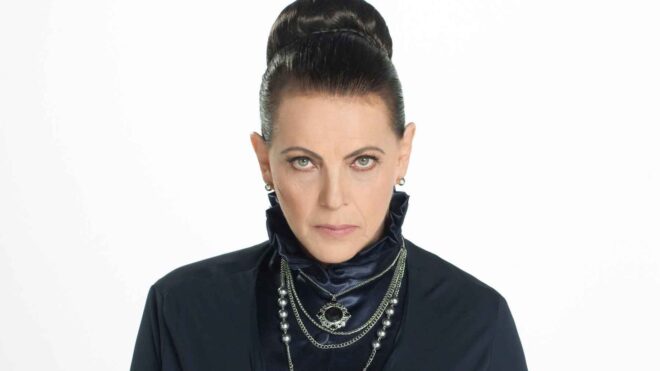
They say you shouldn't judge a book by its cover and after watching Emilia Pérez, I feel like maybe we should start saying that we shouldn't judge a film by its genre. Written and directed by Jacques Audiard, Emilia Pérez is a Spanish-language musical starring Karla Sofía Gascón, Zoe Saldaña, Selena Gomez, and Adriana Paz. I'm not really a fan of musicals, so I almost didn't watch it. But the thing is that it's not your typical musical. It's anything but typical.
More from MamásLatinas: Selena Gomez took Spanish lessons for 6 months to prepare for 'Emilia Pérez'
The film has received much praise and is gathering awards and nominations left and right, but it's the criticism of the film and Selena Gomez's performance in the film by Eugenio Derbez that actually made me watch it. And I'm glad I did, because if ever there was a musical for people who don't like musicals, this would be it. Makes sense since the director himself isn't even a fan of musicals. With all the buzz and criticism surrounding the film, which is expected to get some Oscar nominations, let's talk about everything you need to know about Emilia Pérez.
What is ‘Emilia Pérez’ about?
The official synopsis of the film describes it as "an audacious fever dream that defies genres and expectations." I'm gonna say that's pretty dang accurate. As a viewer you participate in it like you do when you have a crazy dream that doesn't always makes sense, but also makes perfect sense.
"Through liberating song and dance and bold visuals, this odyssey follows the journey of four remarkable women in Mexico, each pursuing their own happiness. The fearsome cartel leader Emilia (Karla Sofía Gascón) enlists Rita (Zoe Saldaña), an unappreciated lawyer stuck in a dead-end job, to help fake her death so that Emilia can finally live authentically as her true self."
In a nutshell what happens?
Without giving too much away, the film is mostly set in Mexico and follows the story of a Mexican cartel leader, Manitas, who undergoes gender-affirming procedures and creates a new life as Emilia Pérez. Emilia's journey is closely tied to the journeys of three other characters in the film.
How did the concept of the film come about?
Originally the script was inspired by Boris Razon's novel Écoute. "Halfway through the book, a transgender drug dealer comes along who wishes to have surgery," Jacques told Netflix. "As the character wasn't that developed over the following chapters, I decided to start my story there." He wrote the version during the first lockdown.
Who are the women of ‘Emilia Perez’ and who plays them?
Zoe Saldaña, whose work includes Avatar and Guardians of the Galaxy, plays Rita Mora Castro, a Mexican lawyer by way of the Dominican Republic. "Rita wishes that she would just have this one opportunity, just any opportunity that will make her break out and break this glass ceiling that she finds herself never being able to shatter," Zoe said of her character. "And when the opportunity presents itself, she doesn't think twice. She just takes it."
Spanish actress Karla Sofía Gascón, whose work includes El Señor de los Cielos and The Noble Family, plays Mexican cartel leader Manitas, who has gender-affirming surgery and creates a whole new life as Emilia Pérez.
"Emilia Pérez is a phenomenal role," Sofía told Netflix. "It's a dream role that is hard to find because it has so much depth, so much richness. And for an actor to get into it, it needs a lot of dedication, and a lot of work because you have two voices that also sing with a Mexican accent. It is so huge."
Selena Gomez, whose work includes Only Murders in the Building, plays Jessi, wife of Manitas. When Manitas fakes his death to become Emilia Pérez, Jessi is very much under the impression that her husband died and she and her children are sent to Switzerland for their safety.
"In the beginning of the film, Jessi is very much content with the life that she's living with the family in Mexico, and that's kind of where she was rooted," Selena told Netflix. "I think she gets so discombobulated once there is a sudden move, and she doesn't know what to do."
Adriana Paz, known for her work in Rudo y Cursi and Las Horas Muertas, plays Epifanía. Epifanía meets Emilia after Emilia has transformed herself into an activist, and in an interesting twist of fate because of who Emilia used to be, the two fall in love.
Accolades for the film came before it was even released.
The film had a limited theatrical release in the US and Canada on November 1, 2024, which was followed by its Netflix release on November 13. Even before that, at the 2024 Cannes Film Festival in May, the film won the jury prize, the soundtrack award, and the best actress award, which was jointly awarded to Zoe Saldaña, Karla Sofía Gascón, Selena Gomez, and Adriana Paz.
But there has also been criticism.
The film marks the first time that Selena acted in Spanish and it did not go unnoticed. Mexican actor Eugenio Derbez was a guest on the Hablando Cine Con podcast with host Gaby Meza and neither one of them had anything good to say about Selena's Spanish in the film.
"Selena is indefensible," Eugenio said. "I was there [watching the movie] with people, and every time a scene came [with her in it], we looked at each other to say, 'Wow, what is this?'" Eugenio also found it strange that the film was created by a French writer and director who does not speak Spanish or English and isn't familiar with Mexican culture.
She politely responded to his criticism in a comment on TikTok. "I understand where you are coming from..I'm sorry I did the best I could with the time I was given. Doesn't take away from how much work and heart I put into this movie."
Eugenio later apologized for his remarks. "Dear Selena, I truly apologize for my careless comments," he wrote via TikTok. "They are indefensible and go against everything I stand for. As Latinos, we should always support one another. There's no excuse. I was wrong, and I deeply admire your career and your kind heart."
Still, the criticism brings up some interesting issues.
Like what's up with Jacques writing and directing a film that is in Spanish and English when he doesn't speak those languages? Well, it turns out that he is no stranger to directing films in languages he doesn't fully understand.
"My conclusion is that I like to work basing my choices on the musicality of the dialogue. In my own language, I'm too attached to the language because I'm an academic," he told Interview in October 2024. "I will obsess over punctuation and commas. Whereas if I don't speak the language, I have the freedom to just focus on the musicality of the language itself. Spanish is a [Romance] Latin language, so I can understand some parts of it."
What about the songs?
The score is a product of the collaboration between singer-songwriter Camille Dalmais and composer Clément Ducol, who are both collaborators in art and partners in life. Together, they created 16 original songs featured in the film, which earned them a nomination for the 82nd Golden Globes in the category of best original score. They also won the Cannes Soundtrack award for their work on the film.
How did they write songs in Spanish when they are both French?
The couple share a studio in Paris and began working on the songs for the film in January 2020. Being native French speakers having to write songs in Spanish, they consulted with a Mexican born-interpreter.
"I love languages," Camille says in an article in Tudum by Netflix, a companion site for the company's original programming. "I would write some ideas in French and translate them, but, very quickly in the process, I would think and sing in Spanish to see how it sounded."
What is the point of the film according to the director?
"Ultimately, what I wanted to do was to make a film that would make me cry," he explained to The Sunday Times. "We live in such dark times that it's important just to give ourselves the permission to be moved collectively, and to have the opportunity to cry."
You can stream Emilia Pérez on Netflix. It has a running time of 2 hours and 12 minutes and is rated R. Whether you end up liking it or not, it will give you something to talk about. I promise you that it's not like any film or musical you have ever seen before. It is refreshing to see films that don't follow the same old tired formulas. Is it perfect? No. Is it art? Yes!




